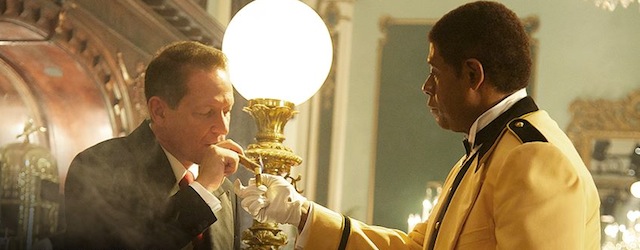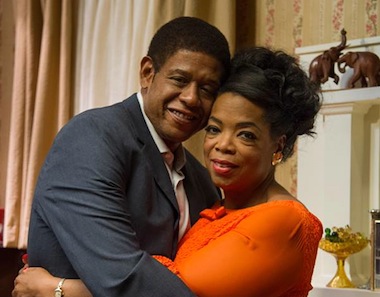Lee Daniels And His 'Butler'
By Scott Lucas in Arts & Entertainment on Sep 19, 2013 7:20PM

I've been groaning at the trailer for The Butler since before it went all Tyler Perry on us and became Lee Daniels' The Butler. A bald-faced Oscar grab of a movie about a White House butler who Forrest Gumps his way through the civil rights struggle with a star-packed cast that includes Robin Williams and Oprah? Count me OUT.
But people really seem to love Lee Daniels' The Butler. It box office take has already cleared the $100 million mark and the strong word of mouth should send it sailing right on to its intended destination—Awards Season and "Lee Daniels' the Oscar." So I decided to check this shit out for myself. And whaddya know? It's pretty Goddamn good.
Now, I've really got nothing against Lee Daniels. I never saw his first movie, Shadowboxer—a movie that its co-star, Helen Mirren, described as "purple." But I liked his raunchy melodrama Precious: Based on the Novel Push by Sapphire. (Even then, the man had a talent for the unwieldy title.) Sure, it was a little clunky, but I loved the rawness of the characters and Mo'Nique was terrifying. After that, Daniels went full-on trash (white trash, that is) with The Paperboy, that movie with the great cast that features that scene where Nicole Kidman urinates on Zac Efron to save his life. Yeah. that one.
Say what you want about Daniels; the guy's got balls. So to see him play it safe and bow to the Academy with that same old claptrap about the good old days of black servitude was as offensive to me as … well, I'd rather watch the former Ms. Cruise piss on Mr. Efron again.
But Lee Daniels' The Butlerisn't that. It's not Driving Miss Daisy and it's not The Help. At least, not completely. This is definitely feel-good pap territory, but this particular pap is spiked with some of that Lee Daniels "purple" juice. The film opens like we'd expect, with Forrest Whitaker patriotically looking up at the American flag while his character's voice is heard on the soundtrack as an old man, telling the story of his life. Except when the camera cuts away from Whittaker, it cuts to a gruesome shot of two black men who have been lynched. So much for my worries about gentility and good taste. Balls? Intact.
 But what really sets this movie apart isn't the comparatively shocking scenes of racial violence, it's the simple fact that Lee Daniels himself is black. From To Kill A Mockingbird to Mississippi Burning, the story of racial struggle in American cinema is too often told by white directors through the eyes of white characters. It's as if well-meaning white folks were the true stars of the civil rights movement. Daniels doesn't go for that. Not one major character is white, and not even the presidents register as much more than blips on the cameo radar (except for an excellent Liev Schreiber as Lyndon B. Johnson giving orders from the White House john). And poor Jimmy Carter doesn't even get a mention. But that's not a criticism—Daniels just isn't very interested in those people. Rather, he spends most of his time with Cecil Gaines (that's Lee Daniels' butler), his family, and their friends and co-workers. And that's fine with me because that's when the movie really comes alive. The scenes in the Gaines household are so assured and full of texture that I was a little bummed every time we had to return to the White House and deal with all that pseudo-history business.
But what really sets this movie apart isn't the comparatively shocking scenes of racial violence, it's the simple fact that Lee Daniels himself is black. From To Kill A Mockingbird to Mississippi Burning, the story of racial struggle in American cinema is too often told by white directors through the eyes of white characters. It's as if well-meaning white folks were the true stars of the civil rights movement. Daniels doesn't go for that. Not one major character is white, and not even the presidents register as much more than blips on the cameo radar (except for an excellent Liev Schreiber as Lyndon B. Johnson giving orders from the White House john). And poor Jimmy Carter doesn't even get a mention. But that's not a criticism—Daniels just isn't very interested in those people. Rather, he spends most of his time with Cecil Gaines (that's Lee Daniels' butler), his family, and their friends and co-workers. And that's fine with me because that's when the movie really comes alive. The scenes in the Gaines household are so assured and full of texture that I was a little bummed every time we had to return to the White House and deal with all that pseudo-history business.
This can make Lee Daniels' The Butler seem like two different movies, and I suppose it is. It was written by Danny Strong, who wrote the HBO "political insider" movies Recount and Game Change, and a lot of the hindsight bias that hampered those films is on display here. It's the part of the film that leads most people (including me four weeks ago) to dismiss it as Forrest Gump-ish. It's also the part of the film that will win awards. Daniels seems acutely aware that his agenda may not be perfectly in tune with the appetite of his Oscar hungry co-producers. (Get this—there are 41 producers on this picture!!! That's a lot of fingers in the pie.)
Watching him try to reconcile that schism makes for some of the film's most interesting moments. In one scene, no less than Martin Luther King Jr. tells Cecil's son that he should be proud of his father. "The black domestic defies racial stereotypes by being hardworking and trustworthy," King's character says. "Though subservient, they are subversive without even knowing it." I couldn't help but read this as Daniels' own take on his position as director of a PG-13 prestige film with a script by a white writer. In the best scene of the movie, Cecil and his wife argue with their son and his Black Panther girlfriend about Sidney Poitier and Guess Who's Coming To Dinner. Cecil is enraged at his son's suggestion that the first black actor to win an Oscar is nothing more than an Uncle Tom. The scene's an instant classic; funny, touching, and would seem to speak volumes about the warring sensibilities at play in Lee Daniels' The Butler. By playing in the confines of the traditional Hollywood race film, Daniels is being subversive and he totally knows it.
But in the end, I must admit that I'm embarrassed to still be surprised to see black characters acting like real people in an American movie. I'm also disappointed that we're not interested in seeing more of it. The most shocking scene in the movie for me was when I realized that Cecil's wife (played, of course, by Oprah Winfrey) and the slimy neighbor, played by the great Terrence Howard, were having an affair. Shock soon gave away to thrill when I realized what Daniels was up to; he wasn't interested in portraying any of his characters as paragons of infallibility—not even Oprah. Nobody in the film is presented as the noble and wise black stereotype that we've come to expect from this kind of film. Instead, they get to behave like everybody does. They call each other names, trade recipes (Oprah, again), tell dirty jokes, drink too much, and argue about movies. Now why should that have to be subversive?
And oh, yeah—Oprah Winfrey is awesome.